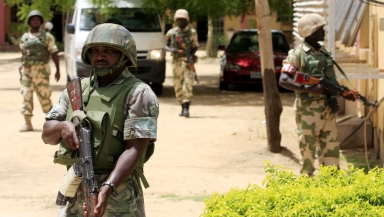
As the world vacillates between outrage and numb impotence in the face of Boko Haram's recent kidnapping of about 230 teenage girls from the mainly Christian enclave of Chibok, northern Nigeria, the questions "Why these girls?" and "How much longer?" beg yet again for answers. But from whom?
A timely piece of research has now appeared to help us understand: it comes from Nigeria's Political Violence Research Network, a new collaborative group. The data in Our Bodies, Their Battleground: Boko Haram and Gender-Based Violence against Christian women and children in North-Eastern Nigeria since 1999 has been offered and assembled at considerable personal risk by hundreds of courageous women and dozens of determined men.
Our Bodies, Their Battleground is neither a series of impersonal statistics nor a simple compendium of stomach-churning testimonies. It goes further by endeavoring to identify and understand the shadowy undercurrents which run through Boko Haram's ultra-Salafist ideology to direct the violence it perpetrates. The authors, Atta Barkindo, Benjamin Gudaku and Caroline Wesley, also explore the facilitating characteristics of the country in which the insurgency has come to operate so effectively.
The unique characteristic of this research, however, is its focus on a hitherto unexplored angle: the extent to which Boko Haram has deliberately targeted individuals on the basis of their religion and gender.
Significantly, according to this research, the fact that Christian women and children suffer at the hands of Boko Haram is not incidental. It is a carefully calculated part of the movement's multi-pronged front-line offensive which is designed to intimidate the population into accepting political-religious change.
Perhaps it is obvious to some that an extreme militant Islamic group would single out Christians and Christian sites as prime targets. Indeed, the report affirms that discrimination against indigenous Christian communities is endemic in at least 16 out of the 19 northern states.
What is less apparent to the Western mind is why, within such targeted Christian communities, women and girls in particular should bear the brunt of such hatred. Do the weakest in society pose such a threat?
Perhaps they are perceived as doing so. Barkindo et al take pains to reveal Boko Haram's numerous justifications for violence specifically against Christian women and girls. According to the report, "reliable sources (in Bauchi State) seem to suggest that Boko Haram attackers believe Christian women are responsible for making their children hold Islam in disdain, as a religion that perpetrates terror." If women, indeed, are the key transmitters of values and beliefs, then the kidnappings, forced marriages and forced conversions of women and girls make strategic sense.
Another such rationale, explained by one abductee, is the twisted use of jizya,a reference to a tax that early Islamic rulers demanded from their non-Muslim subjects for their own protection. Consequently, the fact that this interviewee had been repeatedly raped was justified to her by some of her captors on the basis of 'sex as jizya'.
In fact, by the end of the report, the whole inventory of atrocities makes sense, in a nauseating way. Further, Our Bodies, Their Battleground reveals to the stalwart reader how tremendously effective and efficient it is to focus attacks on women and girls - because the knock-on effects are devastating to the Christian community. Within their culture, survivors of sexual crime often bear the stigma of their attack, especially those who become pregnant or contract HIV/AIDS subsequent to the assault. Entire families and Christian communities are thus 'dishonored', regularly leading husbands to reject wives who are victims of rape, with all the attendant consequences for their children.
Nonetheless, it is not only these loathsome but sadly predictable forms of violence which are highlighted by Barkindo et al. A thorough reading of the research done in the six north-eastern states reveals a picture of Christian women's lives in which more subtle, but just as effective, means of repression are also brought to bear upon them. For each of these, state authorities and/or cultural norms regarding women and girls are shown to play determining roles complicit with Boko Haram in this particular persecution dynamic. This includes the serious variable of women's legal status under Sharia law, notably the value attributed to a woman's testimony. Simply put: when a woman's own word is only considered to be worth half that of a man, then she can be accused or attacked with near impunity because she essentially has no defense.
The report's catalogue of deliberately discriminatory violence suffered by Christian women and girls includes: denial of maternal health care, intentional attacks on places of business where Christian women occupy managerial positions or where they are small business owners, attacks for choosing not to wear an Islamic head covering and the expulsion of Christian widows or female converts to Christianity from their homes and/or, in the case of the latter victims, often domestic abuse.
Our Bodies, Their Battleground avoids over-simplification of the issues, however, by considering Boko Haram's actions within the complexity of the socio-historical-political context. The report does not attempt to minimize the motive of revenge for the 2011-2012 arrests of up to 100 Boko Haram wives and children, nor does it discount the influence of the indigene-settler problems.
Nonetheless, the inescapable conclusion emerges: Christian women and girls are targeted in specific ways because they are simply more visible, more vulnerable, more of an affront, ostensibly more of a threat and ultimately a more efficient means of incapacitating the Christian community. The statistics regarding the abduction, rape, torture and killing of Christian women and children along with the accumulation of trauma which is apparent explicitly and implicitly in this report means that it is not for the faint-hearted. However, it is the very atmosphere of terror created by Boko Haram which lends credibility and value to the testimonies. The mere existence of the data in this report - the fact that some women agreed to reveal what they had suffered in spite of the costly stigmatization and fear of reprisals by Boko Haram - bears witness to its veracity.
Crucially, Barkindo et al have taken a first step to restoring dignity and value to the hundreds of women and girls interviewed by choosing to include their views and analyses, instead of simply using the details of their suffering as data points.
It is these insights along with the statistics and contextual analysis, not to mention the very meaning of Boko Haram ('Western education is forbidden'), which make the 14 April attack on a girls' secondary school seem a logical inevitability. That a large number of the kidnapped teenage Christian girls will now be joining the ranks of victims will not surprise the astute reader of Our Bodies, Their Battleground.
Our Bodies, Their Battleground: Boko Haram and Gender-Based Violence against Christian women and children in North-Eastern Nigeria since 1999
By Atta Barkindo (PhD candidate, SOAS, London) Benjamin Gudaku (Eduwatch Consults and Research Centre, Abuja) and Caroline Katgum Wesley.
(Nigeria's Political Violence Research Network)
(Commissioned by the World Watch Research Unit of Open Doors International, a charity which works to support persecuted Christians around the world)













